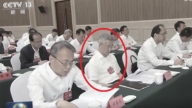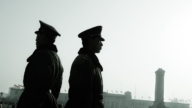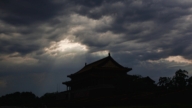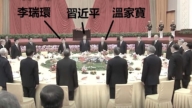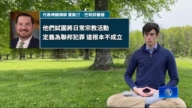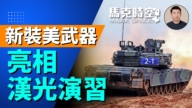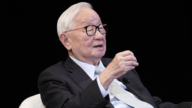【新唐人2013年03月09日讯】被经济学者称为中国财政“两大漏斗”之一的中国军费,一直是各界瞩目的焦点。这次中共人大第一天的政府工作报告中公布,今年国防预算支出7406亿元人民币,较去年增长10.7%。而中国庞大的军费预算始终让邻国不安。那么,未来习近平时代军费增减将如何发展,我们来听听专家怎么分析。
十多年来,中共的国防预算一直呈二位数成长,因此年年受到邻国的关注,“中国威胁论”也长期受到议论。去年以来,钓鱼岛争端,中共强硬的态度更令舆论注意。
“英国广播公司(BBC)”引述日本《读卖日报》的社论指出,中国增加军费,主要是为了加强东海和南海的军事能力,对付美国重返亚洲战略。
北京时政观察人士华颇:“中国军费的增与减不会考虑周边国家的态度,它只能够更多是在口头上强调,我们是和平发展,不会称霸。所做工作也就是这些宣示,实际在军费上不会有多大让步。”
几个月以来,习近平高调视察中共解放军的陆海空军。北京时政观察人士华颇指出,习近平作为军队的总司令,他必须在军队中树立自己的权威。
华颇:“因为前苏联和东欧的巨变,一个关键的因素,就是在关键时刻,军队都出现了倒戈。所以他要保证自己江山的稳固,必须要在军队中树立绝对的权威,对军队起一个绝对的领导,所以在关键的时刻,在出大事的时候才能稳住局面。”
另一方面,习近平跑遍了各个军兵组、海陆空、二炮、武警等单位,并强调军队要绝对忠诚、要绝对听从党的领导、党指挥枪的原则;这也凸显了习近平对军队忠诚度的一个担心。
华颇:“因为,中国现在社会矛盾已经到了激发边缘了,再次发生‘六四’那样大的事件的概率也越来越高。所以,习近平要确保军队关键时候能拉的动,听指挥。所以他军委的人事上,在十八大上也做出了重大调整。”
今年大陆经济成长率目标放缓。华颇认为,随着习近平对军队的稳固,中国军费首先会有进一步的削减。但目前习刚掌握兵权,会考量军方的情绪,所以军费增幅还是达到两位数。
华颇说,习近平对军队恩威并施!一方面立威,整肃军队的腐败现象,另一方面施恩,就是军费的增幅逐步往下调,不愿意太刺激军方。
时事评论家横河则认为,目前中国的经济总量大,军费支出对整个经济发展的影响并不大。
时事评论家横河:“更重要的是,中国在多大程度上,当中国危机发生时,需要用军事力量来转移危机,这个是很重要的。如果说用军事力量来转移政治危机、经济危机,需要很大的时候,那么对军费投入就会增长。我倒不觉得某个人当军委主席后,会有政策方面大的变动。”
另一方面,横河指出,共产党吸引人的本身就是腐败。因此,要把腐败真正反掉了,牵涉的是共产党的存亡,军队也是一样。
横河:“它怎么可能有个人的力量能把反腐败进行下去。当全党都腐败时,你反腐败不是自寻死路吗﹖要就自己死,要么整个党死,做不下去的。作为运动搞一搞是可能的。但不可能有一个真正有效的措施,能够在现在全面腐败的情况下,把这个腐败给挖掉。”
有评论指出,今年6月,军队将再度提高薪水。可以预见,习近平仍会沿用过去一贯的“升官”和“发财”两大法宝去驾驭军队。而未来军费开支的增幅,也就不可能降下来。
根据美国的统计,中国“实际的”军费开支,可能是它公布的数字3倍到4倍。
How Will CCP’ Military Spending Change During Xi’s Rule?
China’s military spending, called by economists one of its
two biggest financial sinks, always draws wide attention.
At the Chinese Communist Party’ (CCP) National People’s
Congress meeting now, CCP announced that the military budget in 2013 will be 770.6 billion Yuan, or 10.7% higher.
As CCP’ huge military spending continues to disturb China’s
neighbors, what will the situation be under Xi Jinping’ rule?
In the last decade, CCP’ military spending continues to grow
by a double-digit, drawing China’s neighbors attention.
“China’s Threat Theory” also becomes a long-standing
hot topic for discussion.
Last year, CCP had shown robustness in the dispute over
Diaoyu (Senkaku) Islands, drawing further media attention.
BBC report cited Japan’s Yomiuri Shimbun’s article,
that CCP’s military increase focuses on the East and South China Sea to cope with the US ‘Back to Asia’ strategy.
Hua Po, Beijing political affairs observer:
”When making decisions about military spending,
the CCP won’t take into account the attitudes of
its neighboring countries.
In most cases the CCP only claims that it will develop
peacefully without seeking hegemony.
All its work is no more than making announcements, etc.
But CCP won’t really compromise on its military increase.”
In the recent months, Xi Jinping made high-profile
inspection tour in the CCP’s military forces.
Hua Po remarked that Xi had to establish his authority
in the military as the new commander-in-chief.
Hua Po: ”In the fall of communism in the Soviet Union and
Eastern Europe, the revolt of military at critical moments had become a key factor.
Therefore to protect his position, Xi Jinping has to establish
authority in the military to ensure his absolute leadership.
Only by achieving this can Xi stabilize the situation
at critical moments.”
On the other hand, Xi had visited most military groups
in his inspection tour, including the army, navy, air force, the second artillery, and the armed police, among others.
He stressed that the army had to be absolutely loyal to CCP,
following the principle of “the Party Commands the Gun.”
This clearly shows Xi Jinping’s worries about the army’s loyalty.
Hua Po: ”Right now, the social conflicts in China
have reached a critical level.
The possibility of having another historic event
like the ‘June 4t Incident’ also grows higher.
Therefore Xi Jinping wants to make sure that the army
will follow his commands at critical moments.
To achieve this Xi also made important personnel changes
in the Military Commission at the 18th CCP’s Congress.”
China’s economic growth is projected
to drop in the coming year.
Hua thinks CCP’s military budget will experience a significant
slowdown after Xi solidifies his leadership in the military.
Currently Xi needs to take care of the army’s sentiments,
as he just took power.
This is the reason why the military spending
maintains a two-digit growth.
Hua Po remarked that Xi attempts to strike a balance
between justice and mercy over the army.
On one hand, he is trying to address the problem
of the widespread corruption to establish his authority;
on the other, he obliges them by cutting down the military
increase in a moderate manner, because he doesn’t want to irritate the military force.
Political commentator Heng He remarked that the military
increase will not influence China’s economic development too much as China has a very large economic pool.
Heng He: ”The more important question is how much
will the CCP depend on the military to solve any crisis.
If a huge military power is necessary to deal with political
or economic crisis in the future, this will lead to increase in the army’ spending.
I don’t think this policy will change much
with the new commander-in-chief.”
Heng He further remarked that being able to “benefit”
from corruption is what the CCP entices its followers with.
If all the corruption is really eliminated,
then both the party and its army will have survival crisis.
Heng He: ”How can the CCP implement anti-corruption
policy with a power from one individual?
When the whole party is corrupt,
anti-corruption is what will destroy it.
This cannot last for long as it would either kill the party,
or the individual himself.
At most it can become
a political movement for a while.
But it will never be really effective in eliminating corruption,
which is already ubiquitous.”
Another article reveals that the salaries in the army
will be raised again in June.
This move can be seen as Xi continuing to win
the army’s loyalty with “power” and “money.”
In such a case there is little chance of seeing a significant
slowdown in the military spending growth.
According to US statistics, China’s “actual” military spending
is maybe 3 to 4 times higher to what CCP announces to be.




